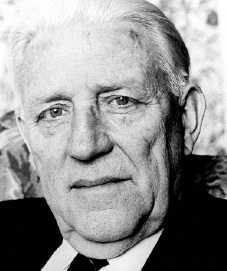Pierre Werner
Pierre Werner, father of the euro, died on June 24th 2002, aged 88
In the end Pierre Werner was mildly surprised that Europeans had meekly abandoned their proud currencies, the franc, mark, lira and so on, and accepted the euro. Perhaps, he suggested, they were weary of arguing. He felt a bit weary himself. He had first suggested a common currency for Europe back in 1960, but had to wait for 42 years before it was launched as real notes and coin six months ago.
Mr Werner is generally accepted as the father of the euro. The euro’s paternity is probably shared among the pioneers of what eventually became the European Union. A common currency for Europe is hinted at in the Union’s founding treaty signed in Rome in 1957. But Mr Werner became its most public advocate; more than that, a zealot. His European colleagues, who tended to be, in public at least, less zealotish, were content that a scheme they adopted in 1971 that eventually led to the euro should be called the Werner Plan. He would get the credit and, if things went wrong, he could also get the blame.
Neither credit nor blame appeared to matter to Mr Werner. What mattered was ending Europe’s terrible tribal wars. Economic problems in Germany had led to the second world war, he said. Now economics would be the peacekeeper. In a speech in 1960 he argued for a common currency called the “euror”, a name soon dropped, perhaps because it sounded like “error”. But Mr Werner persisted, and in his 1971 plan proposed that the economies of European states should come under the control of a central authority in perpetuity. Wouldn’t national sovereignty be sacrificed? Of course, he said. That was the idea. A federal Europe? A logical development.
The simple logic of the Werner proposals has vexed European political leaders that have nationalistic voters. None of the 12 members of the Union that have adopted the euro appears to favour a federal state, certainly not France or Germany, the master-builders of European unity. Its prospect frightens many people in Britain from even contemplating joining the euro. Best then to belittle the Werner Plan. Much had happened since it was nodded through all that time ago. Pierre Werner was a good man, but with limited authority. Did you know he was prime minister of Luxembourg for 20 years? Yes, Luxembourg, an odd country in some ways.
As a fervent European Mr Werner could not have chosen to be born in a more suitable place. Luxembourg was ruled at various times by many other European countries, among them France, Spain, Austria and even the Netherlands. Sometimes the country was sold or given away: its handy size, only 84km (51 miles) by 52km, made it easy to package as a gift to seal an alliance. Germany ignored Luxembourg’s pleas of neutrality and occupied it during both world wars.
Mr Werner was brought up bilingually. His father spoke French and his mother German. He set out to be a lawyer and took a law degree in Paris. Then economics took his fancy and at the outbreak of the second world war he was working for a bank in the Luxembourg capital, also called Luxembourg. With memories of the first

world war still fresh, many people fled to safer places. Grand Duchess Charlotte, the head of the royal family, moved to Canada. Mr Werner, newly-wedded, stayed put with his bride.
The German occupation turned out to be worse than it had been in the first world war. Many Luxembourgers were conscripted into the German army. Jews were sent to extermination camps. In 1944 Luxembourg was the setting for one of the biggest battles of the second world war when allied forces were nearly surrounded, suffered huge casualties, and came close to defeat in what became known as the battle of the Bulge. The experience of war, the ravaged land, the humiliation of the people, the revenge that followed victory when German collaborators were executed; all this shaped Mr Werner’s view of how Europe had to be changed for the betterment of its people (including his five children).He went into politics, and was elected to his country’s parliament in 1945. He rose swiftly and served two long stints as prime minister. But Mr Werner outgrew Luxembourg. He became close to Jean Monnet and others who were creating the Common Market, the forebear of the Union. In his memoirs Mr Werner wrote, “To awake Europeans to the weakness and division of Europe became an intellectual obligation for me.”
In those heroic days, no one seemed to question that the central aim of European unity was to prevent war. Economic gain, though useful, was a secondary consideration. Later, Mr Werner noted sadly, economic gain seemed to have become all important for the Union’s members and applicants. Luxembourg itself has become immensely rich, partly as a result of being a founder member of the Union. Britain’s decision on whether to adopt the euro may turn on five economic tests.
But while Europeans no longer fought each other, many other tribes around the world still did. Mr Werner said there was a road to peace: gradual economic union leading to a single currency for the world. Mondo, he said, would be a suitable name. There may be quite a long wait.